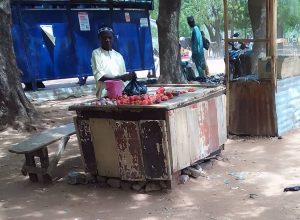By Meikudi Ashiat

Under the dawning gaze of the day, Tukur Shittu was spreading out his peppers on the table in front, this signaled his preparation for the day’s sales at the school market in Usmanu Danfodiyo University Sokoto.
The young boy who hails from Wamako local government of Sokoto State is an apprentice who has been managing the business for quite a long time.
However, the recent scarcity of fuel in some parts of the country has caused untold gloom on business as traders resorted to high selling due to the exorbitant charges in the prices of transportation.
“Ever since the scarcity of fuel, the price we used to carry our goods from where we purchase them has increased and this causes us to increase the price of pepper too,” he explains.
With the high cost of goods and transportation, traders like Shittu are left to resort to increments in their goods which has also depleted their daily profit.
“Before the scarcity of fuel, we used to carry the pepper at the rate of ₦150, but since the scarcity began we now carry at the rate of ₦500 to where we are selling it, but our profit has declined afterward,” he lamented.
Low Patronage of Students
The cynical dearth of fuel in some states in the country has spanned increasing crushes on goods at the market thereby replete the sales on business.
In an interview with computer center owner who craved anonimity, at the school mini-market, Usmanu Danfodiyo University Sokoto, she revealed the low turnout in her business because of the price increase in her output.
The woman attested that fuel scarcity was the main trigger of the skyrocketed price in transportation and goods generally. The already hike in transportation fares doubled and traders are left with no option but to resort to buying fuel at an exorbitant price which instar an increase in their goods and services.
“Adding more money to the price of photocopy and everything is the only option we can meet up because we buy expensive fuel but the low patronage of students is also affected by the hike in fuel.”
Being the type that purchases her goods from Onitsha market, the hike in the price of transportation which is adequately caused by the scarcity of fuel descends to a stringent stance on their sales and inward withdrawal.
“We normally pay the highest price of ₦5,000 for transportation to bring goods of tonal, paper, tonal and other things here to Sokoto State but now with the hike and scarcity of fuel, we paid ₦16,000 to bring them to Sokoto State. Upon this, we still can’t meet up”, she exclaimed.
She addressed that the inevitability of increasing the price of their goods brought down her sales and Patronage.
“It has rendered our business lessened, just like we are in a school environment when things are expensive students will not patronize again, they will rather resort to making it on their phones,” the woman said.
Fuel Scarcity
In the blink of the week, the outbreak of fuel Scarcity has resurfaced in the country descending grimly hardship and struggle on Nigerians amidst the critical period of subsidy removal.
On Tuesday, 7th of May, Premium Times reported how fuel scarcity hit major cities across Nigeria in recent weeks, with attendant effects on businesses and households.
Recall that President Ahmad Tinubu’s cancellation of petrol subsidies on May 29, 2023, unleashed untold adversity on traders as the prices of petrol moved, skyrocketing from ₦187 per liter to between ₦568 and ₦650 per liter.
But in recent times as fuel scarcity continues to bite harder, inflating more on the already skyrocketed price of goods and commodities, traders are resorting to selling their goods higher in having a token to call their own.
“With the glimpse of fuel scarcity, we buy a liter between the rate of #1200 and #1300, even at that, there is no movement in sales and no achievement,” a printing press owner complained.
